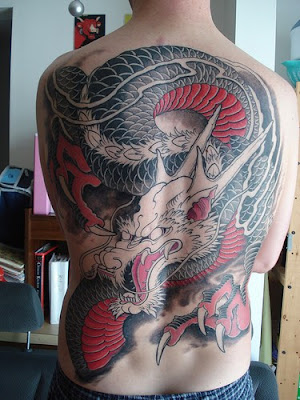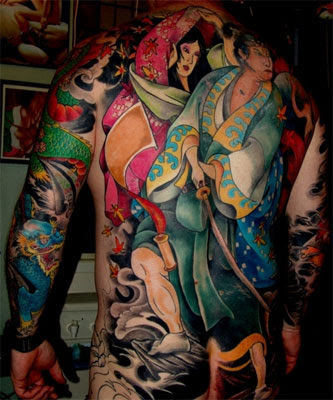With the variety and skills of tattoo artists, one has to wonder why Japanese tattoos are still so popular today. But the truth is, it is not all that surprising. With the colorful history and vast array of designs, Japanese tattoos are not only aesthetically pleasing, but can carry a good deal of meaning.
The remarkable history and style of the Japanese culture has always mystified the Western world. Signs of this are seen most commonly in tattoos. One of the most popular of these is the Kanji tattoo. Kanji is a calligraphy style writing used by the Japanese. The beauty of this particular style of tattoo is both its simplicity and its diversity. You can convey practically any message you wish with the simple and stylish characters.
Other popular styles of Japanese tattoos are steeped in real life or fantasy. From dragons to koi fish, qilin — which are said to be a good omen, bringing serenity and prosperity — to romantic flora like cherry blossoms and lotuses.
The beauty of Japanese tattoos is that you can go well beyond symbols or small, meaningful signs, and create masterful pieces that can cover large areas of your body. For instance, many images can portray beautiful outdoor scenes with large billowy clouds, wind or even fantastic, old fashioned scenes of a wavy ocean. These are often taken from the ukiyo-e or “pictures of the floating world”, which is a genre of Japanese woodcuts. These remarkable scenes can be mixed with many figures from either an outdoor scene, such as flowers or animals; folkloric characters, or something more meaningful to you personally.
Another thing to keep in mind is placement. For instance a hikae, or chest panel tattoo, is a classic placement. This tattoo starts at the chest and blends out into the shoulder, and often down the arm. A nagasode tattoo is considered a “sleeve” piece and starts under the shoulder and down to the wrist, while a shichibu is 7/10ths of the sleeve and gobu is 5/10ths.
Many people take Japanese tattoos further than just covering large portions of their body. Instead, they opt to cover almost their entire body, from neck to mid-thigh. These are often seen with a multicolored pictorial tattoo of the Suikoden, which was, and still is a massively popular set of four novels in Chinese literature. It was originally translated in Japan in 1757 and woodcuts were created for these stories in 1827. Since then, many people enjoy these rich and colorful tattoos that tell classic and unmistakable stories.
Despite the fact that tattooing is still considered rather on the taboo side in Japan, those who seek out either rebellion or a sense of beauty will find themselves drawn to the mystical, unique and splendid style of Japanese tattoos. This style will continue to have a draw for its variety and its colorful nature.
The remarkable history and style of the Japanese culture has always mystified the Western world. Signs of this are seen most commonly in tattoos. One of the most popular of these is the Kanji tattoo. Kanji is a calligraphy style writing used by the Japanese. The beauty of this particular style of tattoo is both its simplicity and its diversity. You can convey practically any message you wish with the simple and stylish characters.
Other popular styles of Japanese tattoos are steeped in real life or fantasy. From dragons to koi fish, qilin — which are said to be a good omen, bringing serenity and prosperity — to romantic flora like cherry blossoms and lotuses.
The beauty of Japanese tattoos is that you can go well beyond symbols or small, meaningful signs, and create masterful pieces that can cover large areas of your body. For instance, many images can portray beautiful outdoor scenes with large billowy clouds, wind or even fantastic, old fashioned scenes of a wavy ocean. These are often taken from the ukiyo-e or “pictures of the floating world”, which is a genre of Japanese woodcuts. These remarkable scenes can be mixed with many figures from either an outdoor scene, such as flowers or animals; folkloric characters, or something more meaningful to you personally.
Another thing to keep in mind is placement. For instance a hikae, or chest panel tattoo, is a classic placement. This tattoo starts at the chest and blends out into the shoulder, and often down the arm. A nagasode tattoo is considered a “sleeve” piece and starts under the shoulder and down to the wrist, while a shichibu is 7/10ths of the sleeve and gobu is 5/10ths.
Many people take Japanese tattoos further than just covering large portions of their body. Instead, they opt to cover almost their entire body, from neck to mid-thigh. These are often seen with a multicolored pictorial tattoo of the Suikoden, which was, and still is a massively popular set of four novels in Chinese literature. It was originally translated in Japan in 1757 and woodcuts were created for these stories in 1827. Since then, many people enjoy these rich and colorful tattoos that tell classic and unmistakable stories.
Despite the fact that tattooing is still considered rather on the taboo side in Japan, those who seek out either rebellion or a sense of beauty will find themselves drawn to the mystical, unique and splendid style of Japanese tattoos. This style will continue to have a draw for its variety and its colorful nature.
 Japanese Festival Tattoos Designs
Japanese Festival Tattoos Designs Japanese Festival Tattoos Designs
Japanese Festival Tattoos Designs Japanese Festival Tattoos Designs
Japanese Festival Tattoos Designs

1 comments:
http://www.tattoobytes.com/memorial-tattoos/
Post a Comment